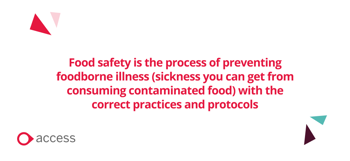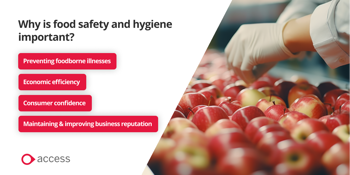 Access eLearning
Access eLearning
Why is Food Safety Training Important?
Food safety refers to the handling, preparation and storage of food in a safe way that reduces the risk of consumers becoming sick from foodborne illnesses. With recent reports highlighting the importance of food safety and the impact food recalls and outbreaks are having, it’s crucial that those involved in handling food know how to do so correctly and carry out the right level of food safety training.
In this article, we are going to answer the question “why is food safety important?”, discuss the laws and legislation surrounding food hygiene, list the benefits of good food hygiene and provide information on the main elements of food safety.
What does food safety mean?
Food safety is the process of preventing foodborne illness (sickness you can get from consuming contaminated food) with the correct practices and protocols. It in involves the entire food supply chain, from the initial growing of the crop through to how it is consumed and covers a range of hazards.
These hazards include:
- Chemical
- Biological
- Physical
- Allergenic
By following best practises and staying compliant to laws via food safety training, you can ensure the safety of consumers and those working with food.
What is food safety training?
Food safety training equips those who handle food with the knowledge and skills they need to manage and prevent potential hazards, reducing the risk of foodborne illnesses or food-related injuries.
This involves:
- Storage
- Handling
- Sanitation
- Personal Hygiene
- Allergens
This type of training is designed for anyone who comes into contact with food as part of their line of work, such as food service employees, café and restaurant managers, pub owners and those who are part of kitchen staff. By utilising food safety training, businesses can remain compliant with food standards and the stringent regulations that come with them.

Why is food safety and hygiene important?
The increase in food recalls from the FSA underscores the importance of food safety and high quality training to support and encourage safe practices.
Below are four reasons that food hygiene must be adhered to:
1. Preventing foodborne illnesses
One of the main benefits of good food hygiene is that it plays a critical role in safeguarding public health by significantly reducing the incidence of foodborne diseases caused by bacteria, viruses, and parasites.
This education empowers individuals to handle food properly, preventing contamination throughout the entire food chain. Improper storage temperatures, cross-contamination between raw and cooked foods, and inadequate cooking practices are all potential causes for harmful microorganisms to thrive.
These situations can be prevented with proper education and training which will equip individuals with the knowledge and skills they need to correctly handle and prepare food.
2. Economic efficiency
Food safety hygiene isn't just about protecting public health; it's also a critical factor in reducing costs associated with foodborne illness outbreaks. These outbreaks can lead to a domino effect of financial burdens, including healthcare expenses for affected customers, potential legal fees if negligence is proven, and lost productivity from employee illness.
Proper food safety education and training for staff empowers them to prevent contamination and handle food safely, ultimately protecting both public health and a business's bottom line.
3. Consumer confidence
Food safety and hygiene go beyond just preventing illness; they directly influence consumer confidence and purchasing decisions. When consumers observe clean and well-maintained food preparation areas, it instils trust and a sense of security in the meals they purchase, which may lead to repeat business.
With the correct training measures, employees will have the knowledge and practices to ensure a safe and hygienic environment. You can find additional tips on enhancing customer experience in a restaurant.
4. Maintaining & improving business reputation
By prioritising food safety hygiene, businesses can demonstrate to their customers that they are committed to providing quality products and ensuring consumer satisfaction. This in turn can improve the reputation and give them an advantage over competitors in the same field.
Proper food safety training for staff ensures consistent adherence to these practices, allowing businesses to confidently showcase their dedication to quality and customer well-being.

Schedule a live demo of our comprehensive, RoSPA accredited Health and Safety eLearning library
The food safety laws & regulations you need to be aware of
When dealing with food safety, there are laws that organisations must be aware of and comply with. Food safety laws are enforced by the Food Standards Agency, often referred to as the FSA, so it’s important to have an understanding of what is expected of those working with food.
Here are some key laws to be aware of:
- Food Safety Act 1990: Sets the foundation for all food safety laws in the UK.
- Food Hygiene Regulations 2013: Focuses on the hygienic handling and preparation of food.
- Food Information Regulations 2014: Requires accurate labelling for non-prepacked foods.
In addition to these core regulations, businesses should also be aware of specific regulations relating to their industry sector. The FSA website offers a wealth of information and guidance to help businesses understand and comply with all relevant regulations.

What are the main elements of ensuring a high level of food hygiene?
By now you should be aware of the laws and regulations surrounding food safety hygiene, but how can these be implemented in your food business?
The four C’s of food safety can help outline the basic principles. These are:
- Cleaning: By taking cleanliness seriously and following strict policies surrounding personal hygiene and cleaning schedules, you can reduce the risk of harmful bacteria.
- Cooking: Ensuring food is cooked thoroughly and following the correct cooking methods and temperatures will make sure food is safe to eat.
- Cross-Contamination: When dealing with food such as raw meat, poultry and seafood, you need to be vigilant about separate work surfaces and utensils and the storing of cooked food.
- Chilling: Chilling food correctly will reduce the risk of bacteria growing, which often occurs when food is left at room temperature for long periods of time.
Now let’s explore how you can adhere to food hygiene standards in the workplace:
1. Personal hygiene
The personal hygiene of employees is critical for preventing the spread of pathogens. By implementing stringent rules surrounding regular handwashing and stressing the importance of clean clothing and protective gear, you can ensure you are reducing the risk of contamination.
2. Food storage
By storing food correctly and following best practices, you can prevent food spoilage and contamination. This means understanding guidance surrounding the correct temperate of food such as meat and avoiding cross contamination of raw foods by using separate utensils and equipment.
3. Cleaning & sanitation
Ensuring proper sanitation of food areas prior to preparing the food is crucial. This is particularly important for utensils and equipment that comes into direct contact with food – so they must be kept clean and used correctly to reduce the risk of bacteria to harbour and spread.
4. Safe food handling
Safe food handling is a continuous process, ensuring food safety from the moment it enters your kitchen to the moment it's served. This includes using the correct thawing techniques to prevent bacterial growth, and using tools such as a food thermometer to ensure food is cooked and served at the correct temperate.
5. Allergen management
Every business dealing with food should be aware of allergy management and the best practices involves. Understanding Natasha’s Law and what it means for businesses involves correctly labelling packages and training your staff on allergen legislation.
6. Pest control
Pests like rodents and insects can contaminate food through droppings, fur, and even their bodies. This contamination can spread harmful bacteria like Salmonella and E. coli, leading to serious foodborne illness. Businesses can prevent this by sealing cracks and entry points, maintaining a clean and tidy environment and using pest control services on a regular basis.
How to get food & safety training for your business
As we have discussed within this article, the importance of food safety cannot be overstated. It's a continuous responsibility throughout the entire food production chain, from farm to fork. By implementing regular health and safety training, you can empower your workforce to become active participants in maintaining food safety. This not only protects consumers but also minimizes waste, improves operational efficiency, and fosters a culture of food safety within your business
You might be unsure how to introduce food safety training into your workforce, but getting started is easier than you think. Firstly, identify how many employees need training. This will depend on your business size and structure. Do all employees handle food directly, or just those in front-of-house or kitchen roles?
Also consider the training style that best suits your needs. We offer a variety of training options which include three different levels of food hygiene training and sector-specific content – meaning your employees will be equipped with the regulations, knowledge and skills needed to handle food safely.
Drive a safety culture with Access Learning

View our Food Safety training
Our Food Safety eLearning course is RoSPA assured and written in partnership with subject matter experts.

Speak to an expert
Chat with one of our learning experts and find out how our Health and Safety courses can help your organisation remain safe and compliant.

Schedule a live demo
Explore the features, functionality and benefits Health and Safety courses has to offer and ask questions to our learning experts.

 AU & NZ
AU & NZ
 SG
SG
 MY
MY
 US
US
 IE
IE





